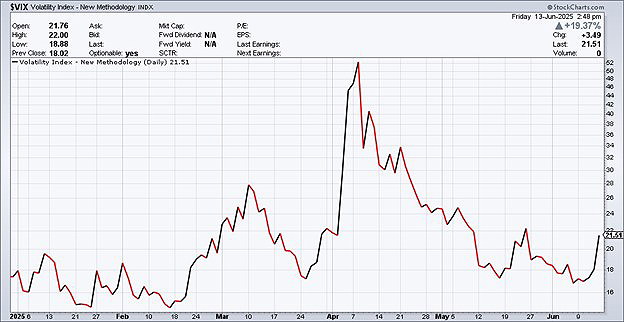WEEKLY MARKET SUMMARY
Global Equities: US stocks were trending higher during the week on soft inflation data but pulled back on Friday after Israel launched targeted strikes on Iranian leadership personnel and nuclear enrichment sites. The S&P 500 dipped -0.4%, the Nasdaq Composite closed -0.6% lower, and the Dow Jones Industrial Average fell -1.3%. US Small Caps also lost ground during the week, declining -1.4%. Developed International Stocks pulled back -0.6% and Emerging Market stocks outperformed with a 0.4% gain.
Fixed Income: Soft inflation data and a strong bond auction caused yields to ease, bringing the 10-Year Treasury yield down to under 4.4%, but yields rose on Friday to end the week at 4.45%. The bond market also got assistance from the Treasury Department stepping in to buy $10 billion in older, illiquid bonds. High yield bonds salvaged a slight weekly gain, rising 0.1%.
Commodities: US West Texas Intermediate (WTI) Crude prices spiked 8% after Israel struck Iran, peaking at $77 a barrel before easing to end the week at $74. Thus far, Israel has not targeted Iranian oil operations, instead focusing on nuclear sites and government officials. Gold prices hit a new high of $3,464 on Friday as investors sought out safe-haven assets amidst the uptick in volatility.
WEEKLY ECONOMIC SUMMARY
Inflation Eases: The May Consumer Price Index (CPI) reading on inflation showed softening prices on both headline and core (ex-food and energy) as both increased just 0.1% during the month. Thus far, the tariff impact has not shown up in the data on car prices and apparel, but most economists believe these segments will see rising prices once inventories are exhausted. Shelter remained the biggest driver of inflation, up 0.3% in May and up 3.9% annually. The Producer Price Index (PPI), reflecting wholesale prices, was also relatively soft at 0.1% in May, although the April data was revised from -0.5% to -0.2%.
Geopolitical Escalation: Negotiations were set to take place over the weekend between Iran and the United States to discuss Tehran’s nuclear program, but those talks were put on hold after Israel hit targets deep inside Iran. Israel targeted nuclear refinement sites while also killing several high-ranking military officials and nuclear scientists in their homes. The strike was somewhat anticipated, as the US pulled diplomats from the region on Wednesday. Iran began to launch retaliatory strikes Friday afternoon in what could become a prolonged conflict.
Consumers Unfazed: US consumers shrugged off concerns over tariffs, geopolitical tensions, and inflation in June; propelling the University of Michigan’s Consumer Sentiment Index to its first gain in six months. The Consumer Sentiment Index rose 16% to 60.5%, although the reading is still 20% lower than December 2024. Predictably, consumer opinions were split down political party lines with Republicans feeling much better about their economic prospects than Democrats.
CHART OF THE WEEK
The Chart of the Week shows the CBOE Volatility Index, commonly known as the “Vix”, over the past year. Volatility spiked to a reading of over 50 during the April 2nd “Liberation Day”, which was the highest reading since the Pandemic. Since then, markets have gotten over the tariff shock and volatility has steadily eased. The Israeli attacks on Iran have caused the Vix to spike on Friday but the overall market reaction was relatively subdued. Compared to the tariff-driven Vix surge, the market looks far less concerned with the rising geopolitical risk – for now.


